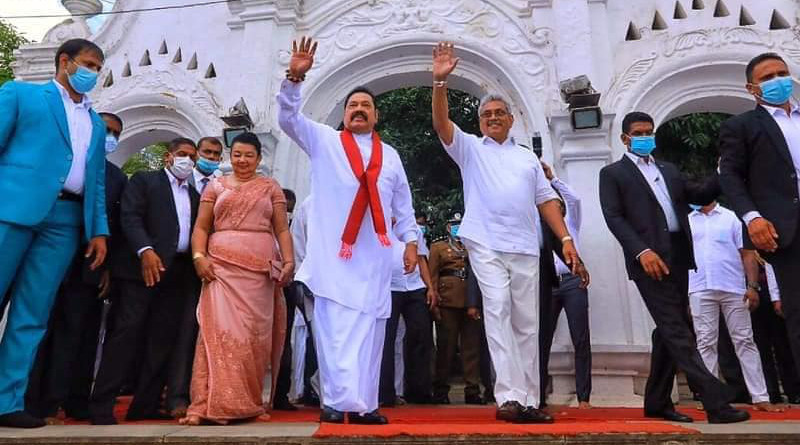By Rajni Gamage*
Facing unique challenges during the COVID-19 pandemic, mounting public debt and international condemnation of human rights violations, Sri Lanka’s foreign policy straddles conflicting domestic and international demands. At home and abroad, the country’s leadership has adopted strongman politics associated with the ruling Rajapaksa family.
This type of strongman politics appeals to sections of the majority Sinhala Buddhist population, especially after the national security negligence of the previous government during the 2019 Easter bombings. Yet despite claiming its foreign policy upholds Sri Lankan sovereignty and independence, the government has paradoxically become more dependent on external forces to achieve its foreign policy goals.
Sri Lanka’s foreign policy dilemmas include the risk of being ensnared by China’s ‘debt-trap diplomacy’ and the need to manage larger states competing for regional dominance. The alleged debt-trap diplomacy refers to China funding white elephant infrastructure in poorer countries with high interest loans so that recipient states, like Sri Lanka, acquiesce to Beijing’s strategic objectives.
Yet this narrative has been debunked by several reports, citing Sri Lanka’s relatively low percentage of debt owed to China. Incompetence and ad hoc decision making — within both the Chinese and Sri Lankan governments — better explain the poor performance of joint Chinese–Sri Lankan development initiatives.
Sri Lanka’s ballooning foreign debt stems from global changes to international commercial borrowing. Since attaining middle-income country status in 1997, it is much easier for Colombo to obtain financing through bilateral loans than from traditional lenders like the International Monetary Fund (IMF), which often require political–economic restructuring as conditionalities to their loans.
Last year, the IMF prematurely ended its US$1.5 billion loan program to Sri Lanka. Difficulty in repaying large amounts of commercial foreign debt has driven Sri Lanka’s deepening reliance on countries like China to tide-over its balance of payments problems.
This ‘dependence’ includes the well-known 99-year lease of the southern Hambantota Port to the Chinese state-controlled China Merchant Port Holdings, which holds a 70 per cent stake in a joint venture with Sri Lanka Ports Authority. In March 2021, Sri Lanka announced a US$1.5 billion currency swap with the Chinese central bank and that it would partner with China in developing two irrigation reservoirs in a UNESCO-protected heritage site, the Sinharaja Forest Reserve. Now a proposed Colombo Port City Economic Commission Bill, pertaining to the single largest private-sector development on the island, is facing contestations within government and civil society over concerns it could become a ‘Chinese colony’.
China also extended economic and medical assistance to Colombo as part of its ‘pandemic diplomacy’, after COVID-19 dealt a major blow to the island’s tourism industry and foreign remittances from the Middle East. These foreign policy overtures have triggered regional anxieties over Beijing’s role in Sri Lanka. These anxieties are foremost among members of the ‘Quad’ — an informal alliance of India, Japan, the United States and Australia — who see China as competing for dominance in the Indian Ocean Region.
The Quad completed its first summit in March this year. But the Chinese government sees it as an ‘exclusive clique’sowing regional division by playing up the ‘China threat’ narrative. While many Quad states provided pandemic-related assistance, especially India as part of ‘Operation Maitri’ and its Neighbourhood First Policy, subsequent foreign policy moves by the Rajapaksa administration weakened the island-state’s so-called ‘non-alignment’ stance.
Such moves include cancelling the US$480 million United States’ Millennium Challenge Corporation (MCC) Agreement and Colombo Port’s East Container Terminal (ECT) development project, finalised in partnership with India and Japan. Although the Sri Lankan government subsequently finalised an agreement with India’s Adani group to develop the West Container Terminal of Colombo Port, the Indian government distanced itself from the deal.
The official Sri Lankan discourse that accompanies backtracking on these development agreements is particularly interesting. The decision to unilaterally call off the ECT agreement was portrayed as the result of unrelenting trade union and civil society group protests against privatisation of state-owned corporations. Meanwhile, a turnaround on the MCC Agreement was framed by the government in terms of upholding the country’s sovereignty against foreign interference.
Despite official pronouncements about independence and sovereignty, the country’s economic and political trajectory is increasingly dependent on finding alternative sources of financial and development assistance from abroad. This dependence is sustained by a militarised form of neoliberal development supported by key sections of Sri Lanka’s ruling elite. The local patronage networks they sustain are essential for managing domestic unrest over increasing living costs, political rights and environmental destruction.
Yet this discourse has considerable purchase with a government under pressure to introduce a new constitution — a reform that would limit the devolution of power through the existing Provincial Council system. It also lends domestic legitimacy to a government facing international pressure over human rights violations, especially after the UN received a mandate to investigate war crimes committed during Sri Lanka’s civil war that ended in 2009.
The UN resolution was criticised by Sri Lankan Foreign Minister Dinesh Gunawardena as a Western-backed move to dominate the Global South, with China being among those states who voted against the resolution.
Given the combination of the domestic and international demands the Sri Lankan government faces, a truly independent foreign policy seems increasingly unlikely in the foreseeable future.
*About the author: Rajni Gamage is a PhD candidate in the School of Political Science and International Studies at the University of Queensland (UQ).
Source: This article was published by East Asia Forum
